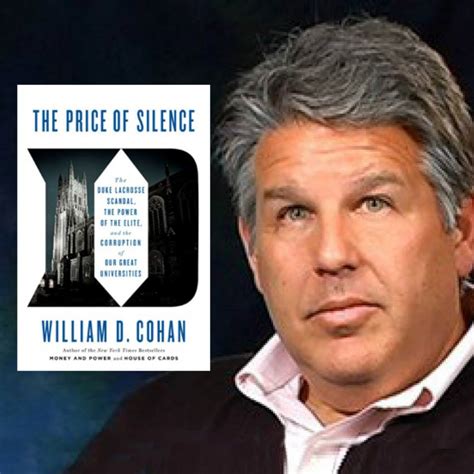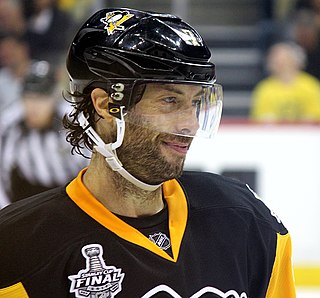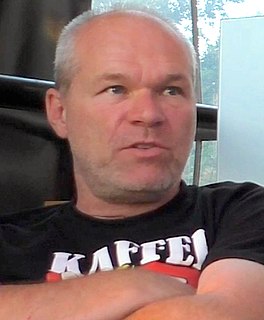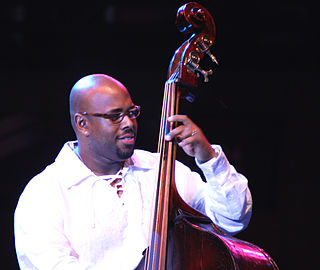Top 254 Stanley Quotes & Sayings - Page 5
Explore popular Stanley quotes.
Last updated on December 22, 2024.
The dirty little secret of what used to be known as Wall Street securities firms-Goldman Sachs, Morgan Stanley, Merrill Lynch, Lehman Brothers, and Bear Stearns-was that every one of them funded their business in this way to varying degress, and every one of them was always just twenty-four hours away from a funding crisis. The key to day-to-day survival was the skill with which Wall Street executives managed their firms' ongoing reputation in the marketplace.
Directors who have inspired me include Billy Wilder, Federico Fellini, lngmar Bergman, John Ford, Orson Welles, Werner Herzog, Stanley Kubrick, Alfred Hitchcock, Francis Ford Coppola and Ernst Lubitsch. In art school, I studied painters like Edward Hopper, who used urban motifs, Franz Kafka is my favorite novelist. My approach to film stems from my art background, as I go beyond the story to the sub-conscious mood created by sound and images.
It's so hard to do anything that doesn't owe some kind of debt to what Stanley Kubrick did with music in movies. Inevitably, you're going to end up doing something that he's probably already done before. It always seem like we're falling behind whatever he came up with. "Singin' in the Rain" (1952) in "A Clockwork Orange" (1971) - that was the first time I became so aware of music in movies. So no matter how hard you try to do something new, you're always following behind.
The genius is not in how much Stanley Kubrick does in “2001: A Space Odyssey,'' but in how little. This is the work of an artist so sublimely confident that he doesn't include a single shot simply to keep our attention. He reduces each scene to its essence, and leaves it on screen long enough for us to contemplate it, to inhabit it in our imaginations. Alone among science-fiction movies, “2001'' is not concerned with thrilling us, but with inspiring our awe.
Two or three years ago, every game I want to score. And after I score a goal I have a spark and I'm so happy I want more. Now I'mkind of different. I'm not saying I lost my spark - I still have it - but I don't chase the goal as much as I used to. I'm playing for the team andI still know I can score, but it's different than two or three years back.Look at great teams like Detroit a couple of years ago; they winthe Stanley Cup and guys only score 25 goals, nobody has a really big season. You have to play defense, that's how you win.
The 2006 playoffs were such a rollercoaster for me. I was able to lean on God and know that no matter what things were going to work out the way they were meant to work out. I had that trust that allowed me to go into the games without fear. When I prayed before games, I was able to just let it go. When I played in game seven of the Stanley Cup Finals, I prayed more that day than I have my whole life. That was a day that I leaned on the Lord a lot. It helped me to face some of my fears.
For those fed up with the lack of mystery at the top of the Premiership, could I refer you to the commanding heights of the Conference. The wide points gap between first and second says we are about to witness the return to the football league of Accrington Stanley. So legendary have they become that everyone across the generations knows them, yet even those of the certain age required (you'd be pushing 60) can scarcely believe they were ever there. What proof do we have that this most Garcia Marquez of football teams was, is and yet may truly be?
I like filmmakers where, if their film comes on and you step in halfway through it, you can recognize that, hey, this is a Coen Brothers film. Or, hey, this is a Stanley Kubrick movie. You can recognize some filmmakers. Like, if you put on a Sam Raimi movie, you can tell that it's a Sam Raimi movie pretty quickly. I like a signature style that people can recognize and relate to, and connect with. I think that is part of why we seek out certain directors. We want to see how they view the world.
I think it's better to be too early and disturb a few people - but have other people say it was necessary - than to do it way after the fact. We shouldn't forget that Charlie Chaplin did a movie about Hitler while Hitler was alive, and Peter Sellers in Stanley Kubrick's masterpiece Dr. Strangelove was during the McCarthy time, where everybody was a communist and McCarthy was flipping completely out. I think it's important to have a movie like Postal now, where we are on the peak of the Iraq War, on the peak of terrorist attacks, where everything is actually happening.
When I came to New York, to Brooklyn, I met Alvin Ailey and Stanley Crouch and August Wilson. They were always putting things in a philosophical context. All the great jazz musicians did, too. There was always a sub-context to what they were saying about music even though they would be very down home and earthy. So I started to develop, in addition to my power and ability to simply hear, a way to place myself in a time.
When you think of diversity, George Duke fits that bill better than a lot of people. He's played a lot of straight-ahead jazz with people like Nancy Wilson and Cannonball Adderley; he's played a lot of fusion with his own groups, with Stanley Clarke; and, you know, he did the rock thing with Frank Zappa. He's written all kinds of big arrangements for people like Burt Bacharach. So, he's covered the board. He's still a great pianist.
It's hard to see a film one time and really "get it," and write fully and intelligently about it. That's a review. That's not film criticism. And there's so many expectations involved, too. You're going in to see the latest Martin Scorsese or Stanley Kubrick film, you really have high hopes, and you can't help but find that it's not exactly what you had in your head going in. Until you can watch it again, you can't accept the work for what it intends to be. It takes at least a second viewing.
Thus, be it understood, to demonstrate a theorem, it is neither necessary nor even advantageous to know what it means. The geometer might be replaced by the "logic piano" imagined by Stanley Jevons; or, if you choose, a machine might be imagined where the assumptions were put in at one end, while the theorems came out at the other, like the legendary Chicago machine where the pigs go in alive and come out transformed into hams and sausages. No more than these machines need the mathematician know what he does.
Early on, before rock 'n' roll, I listened to big band music - anything that came over the radio - and music played by bands in hotels that our parents could dance to. We had a big radio that looked like a jukebox, with a record player on the top. The radio/record player played 78rpm records. When we moved to that house, there was a record on there, with a red label. It was Bill Monroe, or maybe it was the Stanley Brothers. I'd never heard anything like that before. Ever. And it moved me away from all the conventional music that I was hearing.













